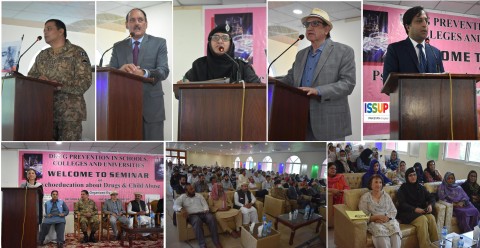Seminar on “Psycho-Education about Drugs and Child Abuse” for Drug Use Prevention In Schools, Colleges, and Universities organized by Department of Psychiatry Poonch Medical Collage Rawalakot-AJK in collaboration with ISSUP Pakistan Chapter and Pakistan Psychiatric Society at Rawalakot-AJK on 22-03-2023.
This seminar was conducted by the Department of Psychiatry Poonch Medical College in collaboration with ISSUP Pakistan Chapter and Pakistan Psychiatric Society on "AWARENESS ABOUT DRUGS AMONG YOUTH IN RAWALAKOT", with the aim to impart apprehension about the drugs and educate about the prevention of the ongoing surge of substance use.
400 people including Teachers, Students of Schools, Colleges and Universities participated in this seminar along with Guest speakers!
Dr. Syed Azhar Ali Kazmi: (Member Executive Committee ISSUP Pakistan Chapter, Chapter Chief Pakistan Psychiatric Society- AJK), HOD Department of Psychiatry Poonch Medical College CHM Rawalakot-AJK took this great initiative to conduct this seminar for the people of Rawalakot and shared the brief Introduction of ISSUP and ISSUP Pakistan Chapter.
Col. Akhtar Zaidi: (Commandant Combined Military Hospital Rawalkot-AJK),
Dr. Shabbir: Head Of Department Community Medicine Pooch Medical College,Rawalakot- AJK
Dr. Rehana Kousar: President American Muslim Women Physician Association (AMWPA) and
Mrs. Samina Raja: Inspector Police in-charge Women Police Station Rawalakot-AJK.
The speakers shared their knowledge and experience to promote positive mental health by minimizing the abuse of drugs and substances and encouraging people with substance use disorder to assess their treatment. Children and teenagers who get drug education learn that all drugs, whether legal and illegal, have the potential to be harmful and that a person's drug experience is influenced by a variety of factors, including the person taking the drug, and the environment.
The awareness model of drug prevention places a strong emphasis on improving one's self-worth and confidence. These educational initiatives are aimed at raising awareness of the risks associated with problematic substance use among adolescents while educating them about the use of illicit drugs. Drug education in schools and educational programs helps students, audience and youth to identify harmful situations, make healthy and safe decisions, and develop coping mechanisms for difficult circumstances.
Drug abuse prevention, is a process which attempts to prevent the duration of substance use or limit the development of problems associated with using psychoactive substances and drugs by focusing on the individual or their surroundings. The most popular drugs used by college students include morphine, opium, cocaine, hashish, and cannabis. Social or familial stress, exam-related anxiety, drug availability, and the bad influences of drug-using friends or roommates are the most prevalent causes of students developing a drug abuse problem. The physical, emotional, and social wellbeing of young people can be negatively and permanently impacted by youth violence. It can hinder development and be a factor in poor decision-making, learning difficulties, a decline in connections with peers and adults, and difficulties managing stress. Thus they are educated to guide their actions and behaviors to lead a happy and healthy life.
The seminar also covered the risk factors of abusing drugs or even its usage that involved a family history of addiction, because drug addiction is more common in some families and child starts to use it when they watched their family member have it, mental health disorder, peer pressure, lack of family involvement or guidance. While the protective factors in drug prevention involved high self-esteem, religiosity, grit, peer factors, self-control, parental monitoring, academic competence, anti-drug use policies, and strong neighborhood attachment
The worthy speakers also shared some ways in order to prevent using drugs by joining the community and environment-based programs, identification of problem referrals, prevention education, joining support groups, and timely contact with professionals psychiatrists, and psychologists.
Dr. Syyed Azhar Ali Kazmi ended this Seminar with thanks to all the Guest Speakers and Participants.

